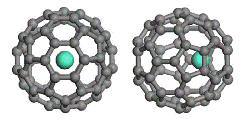Chemistry, Department of: Faculty Series

Xiao Cheng Zeng Publications
Document Type
Article
Date of this Version
March 2007
Abstract
Ab initio density-functional theory study suggests that pillared Li-dispersed boron carbide nanotubes is capable of storing hydrogen with a mass density higher than 6.0 weight% and a volumetric density higher than 45 g/L. The boron substitution in carbon nanotube greatly enhances the binding energy of Li atom to the nanotube, and this binding energy (~ 2.7 eV) is greater than the cohesive energy of lithium metal (~1.7 eV), preventing lithium from aggregation (or segregation) at high lithium doping concentration. The adsorption energy of hydrogen on the Li-dispersed boron carbide nanotube is in the range of 10 – 24 kJ/mol, suitable for reversible H2 adsorption/desorption at room temperature and near ambient pressure.


Comments
Published in arXiv.org, Condensed Matter > Materials Science.